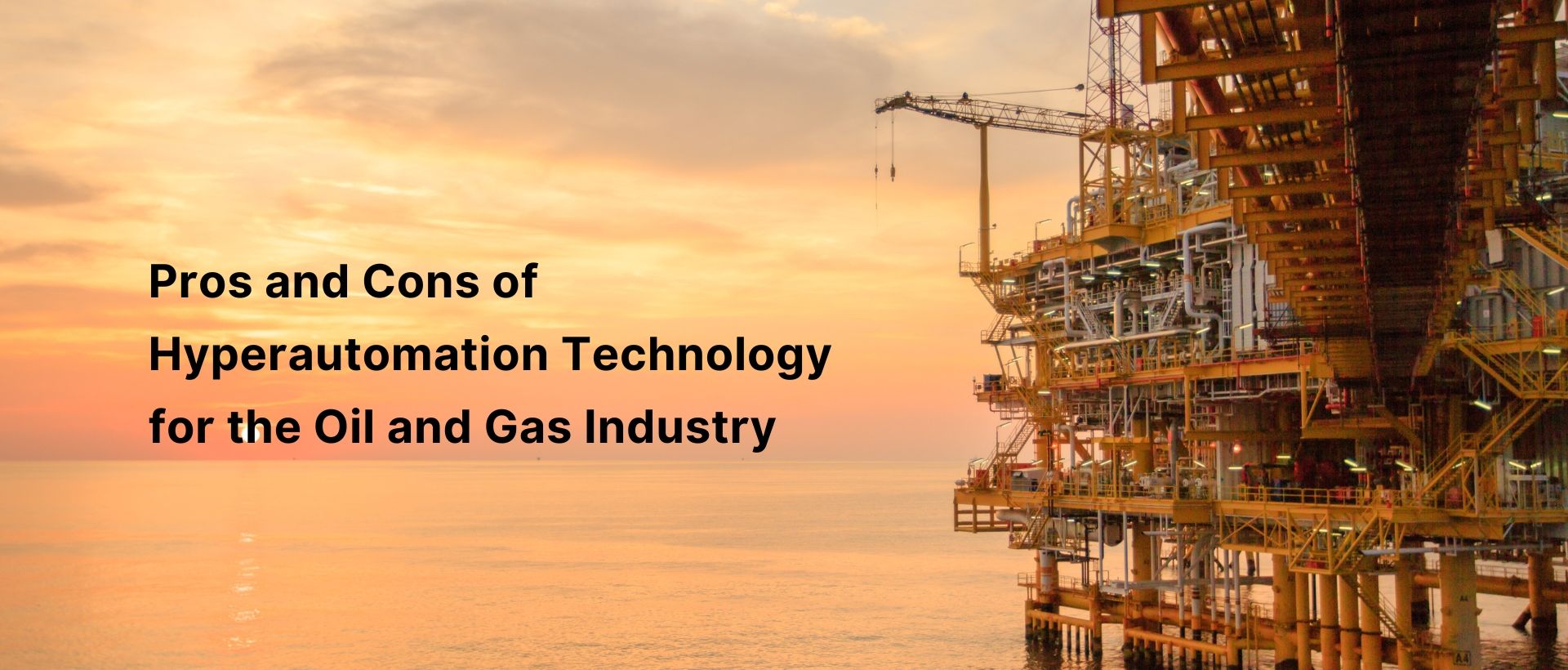
Pros and Cons of Hyperautomation Technology for the Oil and Gas Industry
In today's fast-paced and technology-driven world, industries continuously search for innovative and efficient ways to increase productivity and optimize their processes.

Ennuviz
Company
Table of content
The oil and gas industry is no exception, and hyperautomation technology has become a promising solution to streamline operations and improve overall performance. However, as with any technological advancement, there are pros and cons.
This article will explore the benefits and drawbacks of hyperautomation technology for the oil and gas industries.
First, let's elaborate what is hyperautomation. Hyperautomation definition refers to an advanced automation technology that combines robotic process automation (RPA), artificial intelligence (AI), machine learning (ML), and other digital tools to automate complex business processes.
The technology works to improve accuracy, speed, and efficiency while reducing costs and minimizing human error.
Interesting fact according to
Now, let's examine the pros and cons of implementing hyperautomation technology in the oil and gas industry.
There are several benefits to utilizing
One of the primary benefits of hyperautomation technology is that it can automate repetitive and time-consuming tasks. This can improve efficiency and productivity as employees focus on more strategic tasks requiring human decision-making and critical thinking.
Check out several ways below on how hyperautomation can increase efficiency.
- Streamlining Operations
Hyperautomation can help streamline operations by automating tasks such as data entry, analysis, and report generation. This can reduce the time and effort required to perform these tasks, freeing employees to focus on more complex and strategic work. - Asset Management
Hyperautomation can also help manage assets more effectively by providing real-time visibility into the condition and performance of assets. This setup can help operators make more informed decisions about maintenance, repair, and replacement, optimizing the lifespan and performance of equipment. - Supply Chain Management
It can also help manage the supply chain more efficiently by automating inventory management, procurement, and logistics processes. This capability can reduce costs and improve the speed with accuracy of delivery. - Cost Savings
Automating time-consuming tasks can also lead to huge cost savings for the business by reducing manual labor costs and increasing productivity.
The oil and gas industry is inherently dangerous, and using hyperautomation technology can help improve safety. Automating hazardous tasks for human workers, such as inspecting pipelines and equipment, can significantly reduce the risk of accidents and injuries.
Below are some other ways in which hyperautomation can enhance safety in the oil and gas industry.
- Remote Monitoring
Hyperautomation can enable real-time monitoring of oil and gas operations from a central location, reducing the need for personnel to be physically present on-site. This can help prevent accidents and minimize exposure to hazardous conditions. - Safety InspectionsHyperautomationcan automate safety inspections and compliance checks. This reduces the risk of human error and ensures that safety procedures are followed consistently.
- Emergency Response
Companies can respond quickly and effectively to emergencies like spills or leaks. Automating emergency response procedures and using AI to analyze data from sensors with other sources can help identify the source of the problem to provide guidance on the best course of action.
Hyperautomation technology can also be useful for those pursuing a
This can also help reduce downtime, extend equipment life, and improve overall performance & all critical factors for those in the petroleum industry.
Predictive maintenance techniques, aided by hyperautomation, can analyze data to identify potential issues before they occur. This method enables maintenance teams to take proactive action and minimize equipment downtime.
- Data Collection and Analysis
It can collect and analyze large volumes of data from various sources, including IoT sensors, equipment logs, and maintenance records. This data can create a baseline for normal equipment behavior and detect anomalies that may indicate potential issues. - Machine Learning
Machine learning algorithms can be applied to the data collected by hyperautomation to predict equipment failure and recommend maintenance actions. This can help maintenance teams prioritize their efforts and avoid costly unplanned downtime.
As with other technology usages, there are also cons to consider in using hyperautomation in oil and gas. Take a look at some of them below.
The initial cost of implementing hyperautomation technology can be high, which may be a barrier for some companies. However, over time, the cost savings achieved by the technology can outweigh the initial investment.
Here are some considerations to look at.
- Complex Operations
The oil and gas industry requires high precision and accuracy. Implementing hyperautomation in such an environment requires specialized skills and expertise, which can be costly. - Legacy Systems
Many oil and gas companies still rely on legacy systems that must be designed to integrate with modern technologies. Updating these systems to work with hyperautomation tools can be time-consuming and expensive.
Integrating hyperautomation technology into existing systems and processes can be challenging. Oil and gas companies may need to change their IT infrastructure significantly to accommodate the new technology.
Businesses need to consider the following factors as well.
- Data Integration
Hyper automation solutions rely on data to function, but oil and gas companies often store large amounts of data in different systems and formats. Integrating this data can be a challenge. - Workforce Transformation
Integrating hyperautomation technologies requires a shift in how the oil and gas industry works. Workers require training to work with new technologies and adapt to new working methods.
The implementation of hyperautomation technology could lead to job displacement, as some tasks that were previously performed by humans will be automated. However, companies can mitigate this by retaining employees to focus on higher-level tasks that require critical thinking and decision-making.
The oil and gas industry has already been through significant job losses due to several factors, including declining oil prices, increased competition, and shifts in energy demand. Hyperautomation can potentially exacerbate this trend as machines and software can perform a wider range of tasks.
However, it's important to note that hyperautomation may also create new job opportunities, particularly in data analysis, software development, and maintenance of automated systems. Additionally, as the industry continues to evolve and adopt new technologies, new roles, and job requirements may emerge that require a mix of technical & non-technical skills.
It is important for companies to manage the impact of automation on their workforce proactively. They should ensure workers have the skills to succeed in a rapidly changing industry.
With any new technology, there are always security concerns. Hyperautomation technology requires access to sensitive data, which could make companies vulnerable to cyber-attacks. However, with proper security measures in place, you can minimize these risks.
For reference, check out these security concerns that may arise.
- Increased Cyber-attacks
Using automation and artificial intelligence in the oil and gas industry can increase the number and severity of cyber-attacks. With more data and systems being connected, the potential attack surface grows, making detecting and preventing attacks more challenging. - System Vulnerabilities
Hyperautomation creates more system vulnerabilities that attackers can exploit. Hackers can target automated systems to gain access to sensitive data, disrupt operations, or cause physical damage. - Data Protection
With hyperautomation, vast amounts of data are generated, analyzed, and shared between systems. This data can contain sensitive information such as intellectual property, trade secrets, and financial data. This data can be compromised without adequate protection, leading to financial losses, reputational damage, or legal consequences. - Dependence on Technology
The oil and gas industry relies on technology to operate and maintain its infrastructure. Hyperautomation increases this dependence, making it critical to ensure that systems and technologies are reliable, secure, and resilient. - Human Error
As more tasks are automated, the role of humans in the oil and gas industry will shift towards managing and monitoring automated systems. However, humans can still introduce errors or make mistakes that can lead to security breaches or system failures.
With proper planning, execution, and
The oil and gas industry is no exception, and hyperautomation technology has become a promising solution to streamline operations and improve overall performance. However, as with any technological advancement, there are pros and cons.
This article will explore the benefits and drawbacks of hyperautomation technology for the oil and gas industries.
First, let's elaborate what is hyperautomation. Hyperautomation definition refers to an advanced automation technology that combines robotic process automation (RPA), artificial intelligence (AI), machine learning (ML), and other digital tools to automate complex business processes.
The technology works to improve accuracy, speed, and efficiency while reducing costs and minimizing human error.
Interesting fact according to
Now, let's examine the pros and cons of implementing hyperautomation technology in the oil and gas industry.
The Pros
There are several benefits to utilizing
Improved Efficiency
One of the primary benefits of hyperautomation technology is that it can automate repetitive and time-consuming tasks. This can improve efficiency and productivity as employees focus on more strategic tasks requiring human decision-making and critical thinking.
Check out several ways below on how hyperautomation can increase efficiency.
- Streamlining Operations
Hyperautomation can help streamline operations by automating tasks such as data entry, analysis, and report generation. This can reduce the time and effort required to perform these tasks, freeing employees to focus on more complex and strategic work. - Asset Management
Hyperautomation can also help manage assets more effectively by providing real-time visibility into the condition and performance of assets. This setup can help operators make more informed decisions about maintenance, repair, and replacement, optimizing the lifespan and performance of equipment. - Supply Chain Management
It can also help manage the supply chain more efficiently by automating inventory management, procurement, and logistics processes. This capability can reduce costs and improve the speed with accuracy of delivery. - Cost Savings
Automating time-consuming tasks can also lead to huge cost savings for the business by reducing manual labor costs and increasing productivity.
Enhanced Safety
The oil and gas industry is inherently dangerous, and using hyperautomation technology can help improve safety. Automating hazardous tasks for human workers, such as inspecting pipelines and equipment, can significantly reduce the risk of accidents and injuries.
Below are some other ways in which hyperautomation can enhance safety in the oil and gas industry.
- Remote Monitoring
Hyperautomation can enable real-time monitoring of oil and gas operations from a central location, reducing the need for personnel to be physically present on-site. This can help prevent accidents and minimize exposure to hazardous conditions. - Safety InspectionsHyperautomationcan automate safety inspections and compliance checks. This reduces the risk of human error and ensures that safety procedures are followed consistently.
- Emergency Response
Companies can respond quickly and effectively to emergencies like spills or leaks. Automating emergency response procedures and using AI to analyze data from sensors with other sources can help identify the source of the problem to provide guidance on the best course of action.
Predictive Maintenance
Hyperautomation technology can also be useful for those pursuing a
This can also help reduce downtime, extend equipment life, and improve overall performance & all critical factors for those in the petroleum industry.
Predictive maintenance techniques, aided by hyperautomation, can analyze data to identify potential issues before they occur. This method enables maintenance teams to take proactive action and minimize equipment downtime.
- Data Collection and Analysis
It can collect and analyze large volumes of data from various sources, including IoT sensors, equipment logs, and maintenance records. This data can create a baseline for normal equipment behavior and detect anomalies that may indicate potential issues. - Machine Learning
Machine learning algorithms can be applied to the data collected by hyperautomation to predict equipment failure and recommend maintenance actions. This can help maintenance teams prioritize their efforts and avoid costly unplanned downtime.
The Cons
As with other technology usages, there are also cons to consider in using hyperautomation in oil and gas. Take a look at some of them below.
Initial Cost
The initial cost of implementing hyperautomation technology can be high, which may be a barrier for some companies. However, over time, the cost savings achieved by the technology can outweigh the initial investment.
Here are some considerations to look at.
- Complex Operations
The oil and gas industry requires high precision and accuracy. Implementing hyperautomation in such an environment requires specialized skills and expertise, which can be costly. - Legacy Systems
Many oil and gas companies still rely on legacy systems that must be designed to integrate with modern technologies. Updating these systems to work with hyperautomation tools can be time-consuming and expensive.
Integration Challenges
Integrating hyperautomation technology into existing systems and processes can be challenging. Oil and gas companies may need to change their IT infrastructure significantly to accommodate the new technology.
Businesses need to consider the following factors as well.
- Data Integration
Hyper automation solutions rely on data to function, but oil and gas companies often store large amounts of data in different systems and formats. Integrating this data can be a challenge. - Workforce Transformation
Integrating hyperautomation technologies requires a shift in how the oil and gas industry works. Workers require training to work with new technologies and adapt to new working methods.
Job Displacement
The implementation of hyperautomation technology could lead to job displacement, as some tasks that were previously performed by humans will be automated. However, companies can mitigate this by retaining employees to focus on higher-level tasks that require critical thinking and decision-making.
The oil and gas industry has already been through significant job losses due to several factors, including declining oil prices, increased competition, and shifts in energy demand. Hyperautomation can potentially exacerbate this trend as machines and software can perform a wider range of tasks.
However, it's important to note that hyperautomation may also create new job opportunities, particularly in data analysis, software development, and maintenance of automated systems. Additionally, as the industry continues to evolve and adopt new technologies, new roles, and job requirements may emerge that require a mix of technical & non-technical skills.
It is important for companies to manage the impact of automation on their workforce proactively. They should ensure workers have the skills to succeed in a rapidly changing industry.
Security Concerns
With any new technology, there are always security concerns. Hyperautomation technology requires access to sensitive data, which could make companies vulnerable to cyber-attacks. However, with proper security measures in place, you can minimize these risks.
For reference, check out these security concerns that may arise.
- Increased Cyber-attacks
Using automation and artificial intelligence in the oil and gas industry can increase the number and severity of cyber-attacks. With more data and systems being connected, the potential attack surface grows, making detecting and preventing attacks more challenging. - System Vulnerabilities
Hyperautomation creates more system vulnerabilities that attackers can exploit. Hackers can target automated systems to gain access to sensitive data, disrupt operations, or cause physical damage. - Data Protection
With hyperautomation, vast amounts of data are generated, analyzed, and shared between systems. This data can contain sensitive information such as intellectual property, trade secrets, and financial data. This data can be compromised without adequate protection, leading to financial losses, reputational damage, or legal consequences. - Dependence on Technology
The oil and gas industry relies on technology to operate and maintain its infrastructure. Hyperautomation increases this dependence, making it critical to ensure that systems and technologies are reliable, secure, and resilient. - Human Error
As more tasks are automated, the role of humans in the oil and gas industry will shift towards managing and monitoring automated systems. However, humans can still introduce errors or make mistakes that can lead to security breaches or system failures.
Is Hyperautomation Technology Worth the Change?
With proper planning, execution, and
Recommended Blogs

Let's get started today
Because we put you first. Our customer-obsessed working model honors client's needs.
Schedule DemoJoin our Newsletter. Stay Connected
Empowering Leaders to Transform the Future
Fuel your ambition with expert insights and strategies to drive your Business Transformation. For growth-minded leaders, this is where innovation meets opportunity. Stay bold and lead the curve!

 Ennuviz
Ennuviz


 Ajay Sharma
Ajay Sharma